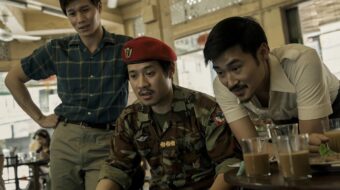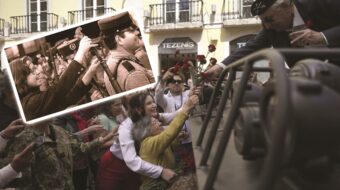
This article originally appeared in People’s World on September 12, 2014.
September 11 was also a day of terror—in Chile in 1973. “I’ve been through this before,” Chilean author Ariel Dorfman wrote of the 2001 U. S. terror day. “The world will never be the same,” he recalls Chileans saying after their September 11.
President Salvador Allende’s Popular Unity movement was the product of long, peaceful political struggle on the part of justice-hungry compatriots who came together as diverse leftist currents. Amidst great hopes, Popular Unity took charge of the government in 1970, through elections. Three years later a military-dominated government under General Augusto Pinochet Ugarte, fascist in all but name, carried out a violent coup and would reign until 1990.
In his farewell message while waiting for his death on September 11, 1973, President Allende explained what was happening: “Foreign capital and imperialism, united with reactionary elements, created the climate for the armed forces to break with tradition [breaking with constitutional guarantees].”
The next year, writing in the British New Statesman, the famous novelist and astute political observer Gabriel Garcia Marquez identified a contradiction: Allende was both a “congenital foe of violence and a passionate revolutionary.” His followers likewise wanted change that was both peaceful and revolutionary. Hopes were high, but a script calling for fatal consequences was already written. That was tragic.
Allende’s dilemma was impossible. Says García Márquez: “Experience taught him too late that a system cannot be changed by a government without power.” That lesson has an application now. In Venezuela, Ecuador, and Bolivia where elected socialists are at the heads of governments and are advancing programs. What is their power?
Perhaps the most poignant message left over from U.S. support for the Chilean coup relates to a U.S. approach to terror that seems not to change. Murder, chaos, and fear were predictable, before the coup. Presumably, U.S. schemers regarded these as acceptable outcomes. Such fallout had marked interventions in the region earlier in the century, examples being Haiti, 1915-1934, and Nicaragua, 1912-1933. And easy tolerance of terrorism continues now as regards Cuba, Venezuela, Colombia and Honduras, and in regions elsewhere in the world.
The distinction is thus drawn between good terrorists, so to speak, and bad terrorists. One set was at work on September 11 in 1973, the other that day in 2001.
The Chilean coup has lessons for people today concerned about U.S. domination in the world. Henry Kissinger, then National Security Council director, famously articulated U.S. motives in 1970 in anticipation of a likely Allende electoral victory. He told U.S. officials planning support for the coup that, “I don’t see why we have to stand by and watch a country go communist by the irresponsibility of its own people.” One takes Kissinger’s sentiment then as precedent for attitudes of entitlement and control prevailing today.
After the Chilean coup, U.S. interventionists were adjusting methods on how to bring down objectionable governments. Direct use of U.S. troops, military proxies, or U.S. agents has waned since Guatemala in 1954, Cuba in 1961, Colombia in 1964, the Dominican Republic in 1965, and Nicaragua in the early 1980s. The U.S. government began to prioritize destabilization campaigns. The U.S. role in Chile was a forerunner of actions taken in Venezuela toward political and economic destabilization of a country engaged in building socialism.
Latin American regional solidarity organizations emerged. The principal ones are the Union of South American Nations (UNASUR), the Bolivarian Alliance for the Peoples of Our America (ALBA), and Community of Latin American and Caribbean States (CELAC). Their watchful presence may serve to block, or at least inhibit, violent, far-reaching U.S. interventions in the future.
Salvador Allende was a teacher who projected courage and optimism. In his last message he said, “Tomorrow belongs to the people, the workers. Humanity advances toward the conquest of a better life. History is ours and the people will make it.”












Comments